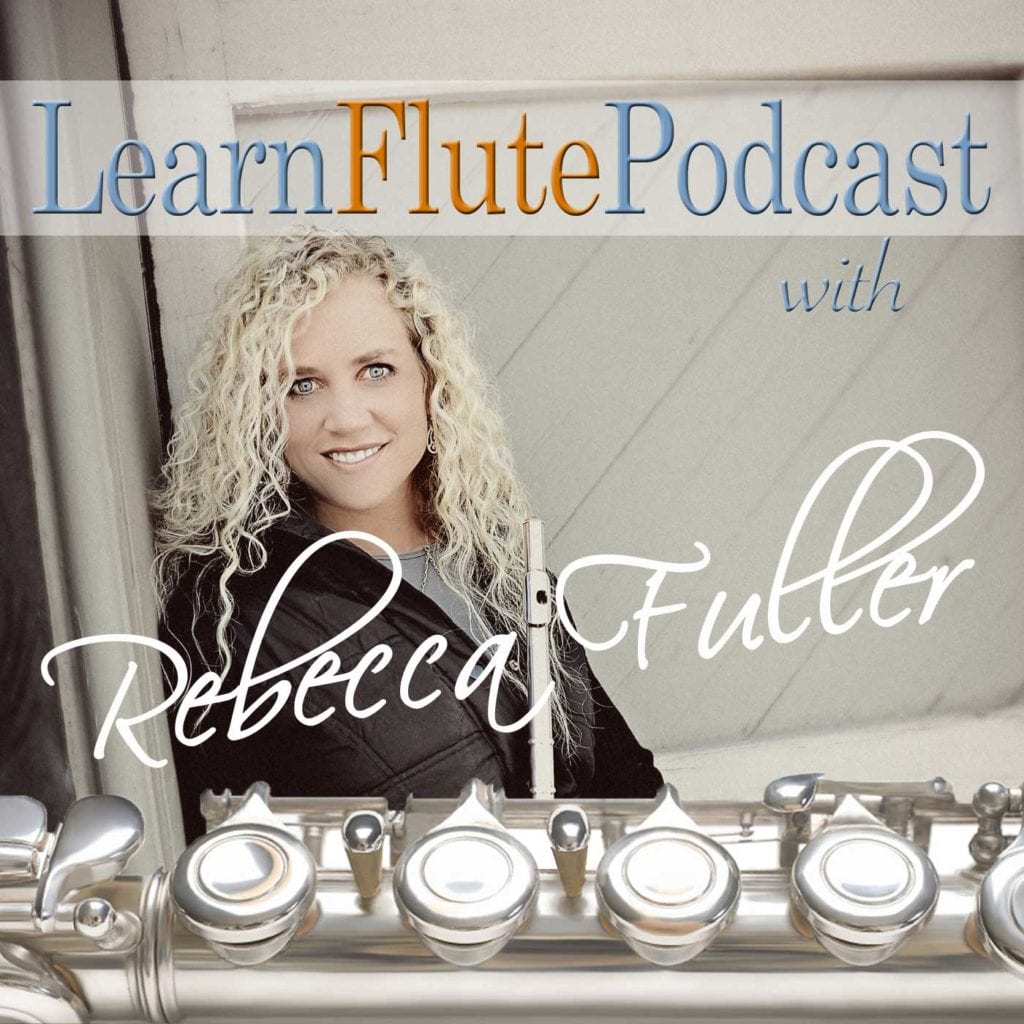Learn Flute Podcast SHOW NOTES:
In this episode, you will learn about a few quick tips for improving your musical ability.
Learn Flute Podcast 105
Press the Play Button to Listen Now:
Podcast Transcript:
Today I have a quick list of things you can do to become more musical as you learn to play the flute. Sound like something you’ve been wishing for? I hope so because the truth is that you definitely have the potential to sound fabulous. So, let’s get started on the journey right now!
-intro-
Welcome, welcome to this podcast here as a part of what I do at Learn Flute Online for the good people of this world who are striving to become musicians and especially on the instrument the flute. We’re having a great time learning and enjoying eachothers company. Did you know that we are a global group? Yep, the members of Learn Flute Online are from literally every corner of the earth. Dozens and dozens of countries even.
I’m so excited you are here today.. Because this means that you are working on it. I’m Rebecca Fuller, your instructor and the expert of all things flute at LearnFluteOnline.com, and the members area. I’m here today to tell you that you can do it. You have the potential to sound and feel really great on your flute. I firmly believe this too.
I have had the pleasure of fostering and witnessing the progression of students from all over the planet of all ages as they start as baby beginners and move their way up the ladder of musical success.
I’m here for you – so let’s learn something else today!
The purpose of this podcast is not to replace any of the lessons or lesson modules I have already pre-recorded for you in the Learn Flute Online programs, but instead, it’s to enhance the lessons and give you new, complimentary thoughts on music and how to succeed and enjoy it even more in your life.
For example, The previous podcast to this one was all about specific ways to start your journey into having a more musical ear. Today’s podcast is another list that will really help you know what kind of things foster a more musical person.
In the lesson modules at Learn Flute Online, you learn exactly what to do to make these things happen. Like listening and playing exercises that demonstrate the skills that you’re gaining. So we learn the what, and the how- and exactly how to do it. Then, we get to use these skills in fun tunes, melodies, and songs you’ve always wanted to learn. This helps solidify the skills and move you along the ladder towards even more success.
A subject like today’s can be used on any level, actually. In fact, I know many people who have been striving for years to learn how to play an instrument well, yet they still sound stiff and disjointed as they play. This might be something you also need help with. So, it’s good you’re here.
Let’s get started on our list right now.
The first thing is to put aside any notion that you may not be able to do this. Yep, give it up because keeping a nagging thought or feeling in the back of your head- that being a musician isn’t for you- is complete nonsense. You can do it. I know you can. And I know you will.
Stick with me here and success is inevitable. I promise. I’ve done it myself and I’ve taught thousands of others. It’s fun, and as you move through the little steps I have set for you, you will definitely have the tools you need to play anything you want on your instrument, sound good while you’re doing it, and enjoy yourself in the process.
So once this is out of the way, you can move into the second idea that is similar to what we talked about in the last podcast episode, which was a lot about using your reticular activator to learn to ‘listen’ like a musician.
If you haven’t had time to check out that episode, please do so. In fact, I’m going to remind you that if you’re a regular listener of podcasts like on apple podcasts or spotify, you can be sure to subscribe to this podcast feed – it’s called the Learn Flute Podcast, and it’s free to you.
We get to chat every couple of weeks about more fun subjects that help us become amazing in what we’re striving to do – Which is enjoy music and be able to play anything we want on our flutes.
Anyway, in the last episode I gave you a challenge to learn to listen to specifics in works of music. And today we’re going to take this skill a step or two further by doing what it takes to ‘perk up our ears’ as we listen and interpret music.
Some people say they feel they are ‘unmusical’. But this simply means they haven’t learned what to listen for yet. If you can hear with your ears, you can do this.
Let me take a side second here to clarify something also about the word “ear” in music.
Some people think this means you have something called ‘perfect pitch’ which is when you can identify the name of a note or pitch out of thin air without having an instrument or any sheet music in front of you.
Some people think that your ‘ear’ in music might mean you have a good or even great sense of relative pitch – which just means that once you know what one pitch or note is, then you can easily figure out the rest in a passage by hearing the relation between them.
And some people think that having an ‘ear’ in music means that you are extraordinarily creative, always sing in tune, and can easily jot down compositions without much thought, or even in your sleep.
Haha, I’m here to debunk these – Having a musical ‘ear’ can include these things, but one thing you need to know is that you can grow all abilities in music. And we can learn relative pitch or how to become extraordinarily creative, but it doesn’t mean that we have to have those skills in order to enjoy or be really good at music, and also to have a nice musical ear.
And, unlike some sports, we can do it for the rest of our lives. Age is no matter. We can just continue getting better and better as we practice and gain more instruction.
So, let’s learn what some of these things are today so that you can take notes and try your hand at a few of them this very week.
You ready? Great. Here we go, lets tap along with the beat.
Haha, sounds too simple, doesn’t it? It’s truly simple… yet it’s not.
Clapping or tapping along with a recorded tune is a very, very good way to gain a nice internal beat. I’ve noticed that this isn’t something everyone is born with for sure.
Ever been to a club or seen a random group of people (of all ages) dancing or attempting to dance? If you have, you may have noticed that some are very fluent and trained looking in their movements… and there are undoubtedly a few others who were a bit awkward and seemed to be doing their own thing.
Well, here’s news for you. Music, most always has a steady beat. People who listen to a lot of music AND also practice involving their body in the listening activity gain a good sense of rhythm which also helps them in situations like playing an instrument especially.
If you know anyone who has trained to be a drummer or a percussionist, they would tell you that steady beat was literally beat into their bodies as they were asked to repeat rhythm patterns over and over and over and over again.
Without a steady beat, music is awkward and unconsciously not very enjoyable to listen to. Much like those dancers who maybe were ignoring the beat or hadn’t practiced working on moving their body to the steady beat.
So get your body into it as you listen, and you can do this in the privacy of your own home, or your own car, or wherever you are. Do you turn on the radio as you drive to work? Do you listen as you clean the house or take a jog? Okay then… it’s time for you to do things in rhythm. I mean it. Turn something on and then move your body to beat. You can clean the kitchen in rhythm. I’ll admit that I do it sometimes.
Find the steady beat and use a part of your body to accentuate it. Wipe Wipe Wipe Wipe the countertop. Sand Sand Sand the wood. Tap tap tap tap tap your palm on the steering wheel as you drive and listen to music. Find the beat.
Do whatever it takes to find it and use it to your advantage. Get any part of your body into it that you can. The more parts of your body the better.
If you’re into exercise, go for an aerobics video where you have to strive to perform the movements to the beat with the leader. You can do it! It’ll enhance your ear and your musical life!
Do you ever hum along?
Okay, it’s time to talk about an elephant in the room. There are many people who feel they cannot sing on tune. It could be one of the reasons you or they have chosen to play an instrument instead of using their voice. You may be one of these people.. Or maybe not.
Either way, I’m here to encourage you to gain control of your pipes. Instead of humming along in your speaking voice range… pay attention and work on a skill like tapping a note on the piano and then working on matching your voice to it. It will take you less time than you think to train yourself to recognize when you are in sync or not. Stay slow and be patient with yourself.
This skill of knowing how to hum along with a tune will serve you in many, many ways as you are on your musical journey.
In one way, it’ll help you learn to recognize pitch – when you’re on and when you’re not on.
It helps you be able to practice when you can’t actually practice. Haha, this means that you can work on your lesson assignments when you don’t even have your flute in your hands. I do this a lot – believe me, it works!
For example, if you’re working on a certain song or a lesson exercise and are having troubles getting the rhythm or melody just right as you play your flute, much of the issue most likely has to do with something called ‘familiarity’.
The more familiar you are with a piece of music or a tune increases the likelihood that you’ll play it with a higher percentage of correctness on your instrument … with less practice time.
Think about it. Why is it that we start learning instruments by using nursery rhymes or songs you heard or sung as a child?
It’s because they are the most familiar to us – and they have simplified rhythms and pitches so we can start solidifying our skills right then and there, even when we are new at them.
Okay. let’s take a quick recap before we finish up here:
The first thing we talked about today was to put aside the idea that you can’t do this. Because you can. Just take my word for it and move ahead.
The second thing we mentioned is to use your body to find the beat so you can grow a nice internal steady beat- which will serve you in literally millions of musical situations.
The third thing is to work on your hum along skills. Literally learn to hum or sing the pieces you’re learning… before you spend dozens or even hundreds of hours trying to play them on your instrument. Hum hum hum! This tip is money.
The last tip I’m going to give you today is to record yourself.

Oooo this sounds a little scary, doesn’t it? Well, no worries. I didn’t say any one else had to hear or see your recording.
Haha, we’re so blessed in this day and age to have technology to our advantage. Those of you who are seasoned enough understand fully how nice it is to have some of these technological wonders at our finger tips.
Haha, I asked my mom what she thought about some of the technology of nowadays, and she said, “I would never wish to go back. We are able to get so smart nowadays. We rarely have to wonder about something for too long”.
Haha, definitely I think she’s right. Remember that stretching yourself in new ways is fun. Small achievements are the perfect way to feel success in life.
I am so excited to be a part of your musical journey. We are capable, confident, and enjoy exploring together.
Well, thanks for being here today. You know you have my heart and my attention.
I can’t wait to hear how you’ve been using these exercises and thoughts that we talk about here at Learn Flute Online and on this Learn Flute Podcast.
Remember to get into the Gold Level or if you’re more advanced get into your Intermediate / Advanced Level lesson modules here at Learn Flute Online. I created them for you!
You can come learn at your own pace and on your own schedule. Oh, I’ll be putting out a new series of these podcasts this year, and it would be really nice if you’d drop me a note of ideas of what you’d like to hear about.
So here’s to you and your musical fun this week.
See you again soon!
Bye now.
Thank you for Tuning In!
Please consider subscribing and taking a minute to leave a review and rating for the podcast on iTunes.
I hope you’ve enjoyed learning about how to improve your musical abilities. Join us for the next episode!








